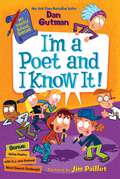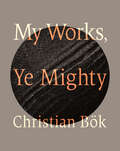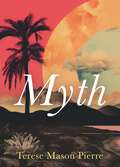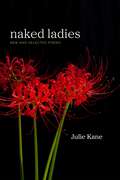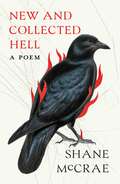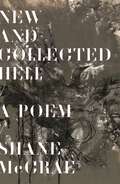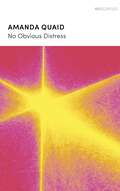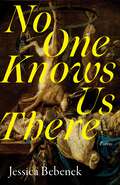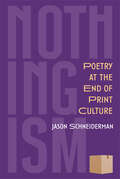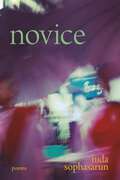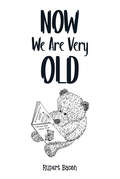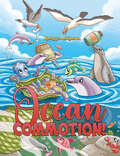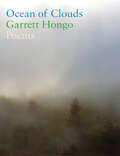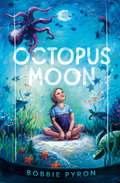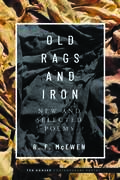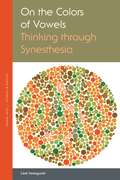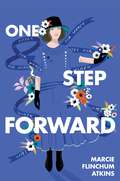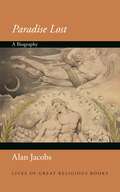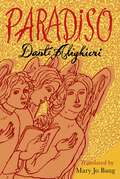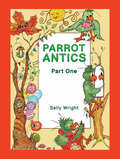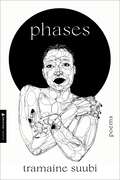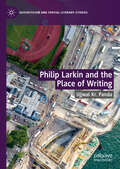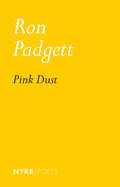- Table View
- List View
My Weird School Special: I'm a Poet and I Know It! (My Weird School Special)
by Dan GutmanWith more than 35 million books sold, the My Weird School series really gets kids reading! A.J. must figure out how to write the best poem to win a contest in this My Weird School Special from New York Times bestselling author Dan Gutman and veteran illustrator Jim Paillot.To celebrate National Poetry Month, Ella Mentry School will have a schoolwide poem-writing contest, and all the students have to enter. There’s just one problem: A.J. has no time for rhymes!But when an amazing secret prize is revealed, will A.J. be inspired to write a winning poem? And can he beat Little Miss Know-It-All Andrea—the best poet in school?Dan Gutman’s signature kid-friendly sense of humor and Jim Paillot’s fun illustrations are perfectly blended in this weird poetry special you won’t want to miss—featuring bonus poetry writing tips from A.J. and Andrea, games, puzzles, and more!
My Works, Ye Mighty
by Christian BökMy Works, Ye Mighty expands upon the conceptual literature of Christian Bök, particularly his ongoing project, entitled The Xenotext. Based upon work conducted during his tenure as the Writer-in-Residence at Athabasca University, this essay addresses the concept of "scale" in poetry, meditating on this topic with an abundance of imagery; moreover, his essay appears, alongside an epic poem, especially written by him for this publication.
Myth
by Terese Mason PierreMyth, the much-anticipated debut collection from the multi-talented Terese Mason Pierre, weaves between worlds (‘real’ and ‘imaginary’) unearthing the unsettling: our jaded and joyful relationships to land, ancestry, trauma, self, and future. In three movements and two interludes, the poems in Myth move symphonically from tropical islands to barren cities, from lucid dreams to the mysteries of reality, from the sea to the cosmos. A dynamic mix of speculative poetry and ecstatic lyricism, the otherworldly and the sublime, Pierre’s poems never stray too long or too far from the spell of unspoiled nature: “The palm trees nod / at the ocean / the ocean does / what it always does / trusts the moon completely.” Friends ‘with benefits’ tour the wonders of Grenada’s landscapes; extraterrestrials visit the Caribbean and the locals don’t seem phased; red birds “saunter airily like tourists,” La Diablesse lures helpless suitors to their dooms. This collection asks: How can myths manifest themselves in our daily lives? What do we actually mean when we say we love ourselves and others? And how do we pursue/create futures that honour our truths, histories and legacies?
Naked Ladies: New and Selected Poems (Southern Messenger Poets)
by Julie KaneCapturing the breadth of Julie Kane’s poetics across nearly four decades—formalist and neo-confessional, steeped in both Boston Irish-American and New Orleans cultures—Naked Ladies displays the full range and achievement of her work. Gathered here in one volume are selections from Kane’s five previous collections, including her long-out-of-print first book and her subsequent winners of the National Poetry Series and Donald Justice Poetry Prize. Readers will also find a generous selection of new and previously uncollected work. The title of this milestone collection acknowledges Kane’s place in the tradition of women confessional poets, evokes the nickname of a common Louisiana flower, and nods to the honesty and frankness that characterize her poems’ speakers.
New and Collected Hell: A Poem
by Shane McCraeAward winning poet of our times Shane McCrae, 'peer to the peerless' (New York Journal of Books), takes up and turns on its head the mantle of Dante in this contemporary vision of Hell.Of death the muse is death the muse of HellIs death the muse of Heaven I don't knowO muse of where howcan I hope to goTo where I pray I'll go sing at least tellShane McCrae, one of the most prophetic and powerful poetic voices of our time, has created a twenty-first-century epic in New and Collected Hell. As David Woo wrote in Poetry, 'McCrae's poems allude to literary precursors like Dante, Milton, and the Bible, but the voice is unabashedly of our time . . . By seeking to heal the rift in his own identity, McCrae has listened intently to the literary echoes emanating from the English language and transmuted them through his own dynamic voice.' Here, he gathers new and previous work as a culmination of his long-standing poetic project: a new and unforgettable journey through Hell. McCrae's work is indelible, and this collection brings his searing vision to new depths.
New and Collected Hell: A Poem
by Shane McCraeShane McCrae, “peer to the peerless” (New York Journal of Books), takes up and turns on its head the mantle of Dante in this contemporary vision of Hell.Of death the muse is death the muse of HellIs death the muse of Heaven I don’t knowO muse of where howcan I hope to goTo where I pray I’ll go sing at least tellShane McCrae, one of the most prophetic and powerful poetic voices of our time, has created a twenty-first-century epic in New and Collected Hell. As David Woo wrote in Poetry, “McCrae’s poems allude to literary precursors like Dante, Milton, and the Bible, but the voice is unabashedly of our time . . . By seeking to heal the rift in his own identity, McCrae has listened intently to the literary echoes emanating from the English language and transmuted them through his own dynamic voice.” Here, he gathers new and previous work as a culmination of his long-standing poetic project: a new and unforgettable journey through Hell. McCrae’s work is indelible, and this collection brings his searing vision to new depths.
No Obvious Distress: A John Murray Original
by Amanda Quaid'Striking, surprising, and technically excellent, the poems resonate way beyond their endings' Roger Robinson'Deft, daring, devastating and delightful' Pádraig Ó Tuama'Astonishing. These poems glimmer with a white-hot beauty that is hard won, and that sings' Sarah RuhlPatient is a normal appearing woman in no obvious distress.On an ordinary day, out with her three-year-old in the park, Amanda Quaid received a life-changing call - the back pain she had been living with for years was actually a rare and aggressive form of cancer. In an instant, life became a series of sterile rooms, medical charts and body-altering treatments which completely upend Amanda's marriage, work and family life as she knows it.Poetry became a lifeline for Amanda, a form to organize the chaos and pain of day-to-day life into order and beauty. In inventive and arresting poems that explore desire, marriage, motherhood and mortality, No Obvious Distress is a powerful memoir-in-verse about Amanda's unique experience. But it is also a tender, witty and universal collection that asks how we can continue to live and love in times of uncertainty.
No Obvious Distress: A John Murray Original
by Amanda Quaid'Striking, surprising, and technically excellent, the poems resonate way beyond their endings' Roger Robinson'Deft, daring, devastating and delightful' Pádraig Ó Tuama'Astonishing. These poems glimmer with a white-hot beauty that is hard won, and that sings' Sarah RuhlPatient is a normal appearing woman in no obvious distress.On an ordinary day, out with her three-year-old in the park, Amanda Quaid received a life-changing call - the back pain she had been living with for years was actually a rare and aggressive form of cancer. In an instant, life became a series of sterile rooms, medical charts and body-altering treatments which completely upend Amanda's marriage, work and family life as she knows it.Poetry became a lifeline for Amanda, a form to organize the chaos and pain of day-to-day life into order and beauty. In inventive and arresting poems that explore desire, marriage, motherhood and mortality, No Obvious Distress is a powerful memoir-in-verse about Amanda's unique experience. But it is also a tender, witty and universal collection that asks how we can continue to live and love in times of uncertainty.
No One Knows Us There
by Jessica BebenekFrom wherever I am, I willsend word like a golden thread,rolling an unravelling ball through time?towards myself.In this stunning debut collection, Bronwen Wallace Award finalist Jessica Bebenek presents two distinct and moving portraits of early womanhood. The first is that of the devoted, caregiving granddaughter navigating hospital hallways and the painful realities of palliative care. The second is that of a woman a decade older, compassionately looking back on her younger self, honouring unimaginable loss and turning it into genuine healing.All at once sensual, visceral, and dreamlike, No One Knows Us There takes us from the sterility of the hospital into the sumptuous natural world. We face horror in a manicured garden and discover beauty in the untamed woods. A theoretical mathematician leads us to an elk encounter, the crooked bodies of birds are found in the spring thaw, and we become our own pet snail in a mason jar.Ultimately, grief is radically transformed through plainspoken yet lyrical language, and this keen examination of trauma evolves into a striking celebration of the inevitability of change.
Nothingism: Poetry at the End of Print Culture (Poets On Poetry)
by Jason SchneidermanWhat is the internet doing to poetry? Good question! In Nothingism, Jason Schneiderman grapples with the way that digital culture has begun to reshape America’s poetry landscape, examining this profound shift in the way that poetry is written, read, and taught. He dives into the history of the poetic line and how previous media (oral, manuscript, print) have shaped our understanding of exactly what a poem is. In considering the transformations of poetry in the digital age, he finds that the transition from print to digital culture mirrors the earlier transition from manuscript to print culture. In this collection, the essays range from blistering manifesto to deep historical dives to gentle classroom guidance to considerations of the poems of James Merrill and Agha Shahid Ali, moving between the theoretical and the practical. Nothingism is both deeply personal and highly erudite, providing an engaging and scholarly account of reading, writing, and teaching poetry as our world continues its unsupervised lurch toward digital culture.
Novice: Poems (Sewanee Poetry)
by Nida SophasarunHow close can a person come to home when their family has deserted it? Guided by this question, the poems in Nida Sophasarun’s Novice traverse natural, animal, and dream worlds, seeking intimacy in a snake coming in from the rain, a mother’s body imagined as a house, and the moon serving as both the missing piece and the linchpin in a night sky. Organized by tropical seasons and unfolding in Asia and the American South, Novice proposes that home is monumental and ruined, remembered and forgotten, local and diffuse, peopled and haunted.
Now We Are Very Old
by Rupert BaconIf poetry be the food of love, read on’ as some particularly famous playwright bloke once said or maybe he didn’t. It might have been that he said, ‘if music be the food of love, play on’. Frankly, be that as it may, this composer of little rhyming ditties thinks poems are rather fun and many of them are, in any case, about things he loves. Thus, it works either way. This little volume of twenty-four poetic offerings on various themes (plus one totally free extra ditty in the introduction, please note) rather proves the point even if the author most un-humbly does say it himself. Read out loud with rhythm in your voice. Set them to music of your own choosing and sing them if you like. However you prefer to take your poems, please enjoy them for what they are: a bit of simple fun.
Ocean Commotion!
by Kathryn AtkinsonFar out in the ocean, a pod of dolphins spots something unusual. As they swim closer, one curious dolphin ventures ahead for a better look and discovers a hoard of floating plastic waste. Shocked and angered by the pollution, the dolphins decide it is time to teach humanity a lesson for polluting their seas. Working together, the pod devises a bold plan. They will transport the plastic waste back to shore, blockade the port, and create chaos – all to draw attention to the urgent problem of plastics in the ocean.
Ocean of Clouds: Poems
by Garrett HongoIn his fourth book of poems, award-winning poet Garrett Hongo sees coastlines and waters, skylines and ancestral lines for what they inspire and teach.In a surpassingly beautiful collection of poems, with his characteristic long-lined, rolling music, Hongo is alert to the possibilities of individual moments of perception and grace in the landscapes of his life, whether waiting for a ferry in Balboa after a writing workshop (&“An oil slick from a yacht . . . / Spread rainbows on the water, an aleph / curving toward us&”) or hanging out and playing LPs with the late, great poet Michael Harper, or watching his daughter in the sun with a halo of messy twelve-year-old&’s hair, or listening to the sea, which speaks to him in so many places: at the Wai&‘ōpae Tidepools, at Cassis, at Divi Bay in Saint Martin, where, he tells us, &“I thought of writing to the soul of Nâzim Hikmet, / saying loving a woman was like writing a book— / . . . it is love&’s body on which you write a page of kisses . . .&”These poems of cloudy moons and sandstone cliffsides, the black glass of lava shattered into sands, waves surging, and stories of a poet&’s gratitude for the journey he has made, come together to make a paean against forgetting.
Octopus Moon
by Bobbie PyronA deeply moving middle grade novel in verse about a girl struggling with depression when she starts fifth grade amidst a sea of changes.Pearl loves watching the majestic loggerhead turtles and octopuses glide through the water at the aquarium. Pearl finds it especially easy to identify with the octopuses, who have millions of touch receptors all over their bodies. They feel everything. Sometimes, Pearl wishes she was more like a turtle, with a hard outer shell—it hurts too much to feel everything.And the changes at the start of fifth grade don&’t feel good to Pearl at all. New teachers, lockers, and being in different classes than her friends is unsettling. Pearl tries her best to pretend she&’s fine, but she starts to struggle with things that used to come easy, like schoolwork, laughing and skateboarding with her best friend, Rosie, running and even sleeping.After a disastrous parent-teacher conference, her parents decide to bring Pearl to Dr. Jill, who diagnoses her with depression. At first Pearl is resistant to Dr. Jill&’s help; she doesn&’t like feeling different, but she also doesn&’t want to continue feeling so bad all the time. When Dr. Jill asks Pearl to try one Impossible Thing each day, like running, skateboarding, or walking her dog Tuck, she decides to try. For each impossible thing she attempts, Pearl puts a bead on a string. Bead by bead, and with the support of family and friends, Pearl finds her way back to herself. She discovers just like the moon is always there in the sky, even if it isn&’t full, she&’ll always be herself even when she doesn&’t feel whole.In this tender novel-in-verse, critically acclaimed author Bobbie Pyron draws from her own experiences to tell the story of a brave girl learning to take care of and love herself.
Old Rags and Iron: New and Selected Poems (Ted Kooser Contemporary Poetry)
by R. F. McEwenOld Rags and Iron is a collection of narrative poems about the life experiences of working-class people with whom the author, R. F. McEwen, is not only acquainted but whose lives he has shared. McEwen supplemented his income as a teacher while working as a professional logger and tree trimmer, and he writes with great love and respect for blue-collar families. Set primarily in the back-of-the-yard neighborhood of South Side Chicago, where McEwen grew up, as well as Pine Ridge, South Dakota, western Nebraska, Ireland, and elsewhere, the poems celebrate many voices and stories. Utilizing tree-trimming as a central metaphor, these poems of blank verse fictions reverberate like truth.
On the Colors of Vowels: Thinking through Synesthesia (Verbal Arts: Studies in Poetics)
by Liesl YamaguchiTreatments of synesthesia in the arts and humanities generally assume a clear distinction between the neurological condition and the literary device. Synesthetes’ descriptions of colors seen in connection with music, for example, are thought to differ fundamentally from common expressions that rely on transpositions across sensory dimensions (“bright vowels”). This has not always been the case. The distinction emerged over the course of the twentieth century, as scientists sought to constitute “synesthesia” as a legitimate object of modern science.On the Colors of Vowels investigates the ambiguity of visual descriptions of vowels across a wide range of disciplines, casting several landmark texts in a wholly new light. The book traces the migration of sound-color correspondence from its ancient host (music) to its modern one (vowels), investigating the vocalic Klangfarben of Hermann von Helmholtz’s monumental Sensations of Tone, the vowel colors reported in early psychology surveys into audition colorée (colored hearing), the mis-matched timbres that form poetry’s condition of possibility in Stéphane Mallarmé’s “Crisis of Verse,” and the vowel-color analogy central to both the universal alphabets of the nineteenth century and the phonological universals of the twentieth. The book’s final chapter turns to an intricately detailed account of vowel-color correspondence by Ferdinand de Saussure, suggesting how the linguist’s sensitivity to vowel coloration may have guided his groundbreaking study of Indo-European vocalism.Bringing out the diverse ways in which visual conceptions of vowels have inflected the arts and sciences of modernity, On the Colors of Vowels makes it possible to see how discourses of the nineteenth and twentieth centuries crafted the enigma we now readily recognize as “synesthesia.”
One Step Forward
by Marcie Flinchum AtkinsA Junior Library Guild Gold Standard Selection!One Step Forward is a compelling debut YA historical fiction novel in verse about Matilda Young—the youngest American suffragist imprisoned for picketing the White House to demand women’s right to vote.Raised in a politically divided family, Matilda wondered if she could be as courageous as her older sister who fought for suffrage. Joining the radical protest movement came with plenty of risk. Women were routinely scorned, harassed, arrested—and worse. And taking a stand for her rights could tear her family apart.Told in powerful verse, One Step Forward follows Matilda's coming-of-age journey as she takes her first step into action. Amid the backdrop of World War I, Matilda’s story vividly highlights the extreme mental, physical, and emotional battles faced by the protestors leading up to the passage of the Nineteenth Amendment. It also reveals the bravery, hard work, and spirit of the women who paved the way for future generations to use their voices and votes.
Over in the Garden
by Janna MatthiesGardening fans will swoon over this bright and gorgeous counting picture book based on the folk song &“Over in the Meadow&”—packed full of colorful plants, adorable gardeners, and the numbers one to ten.Over in the garden, in the weeds, in the sun,bent a brave little gardener with her little shovel ONE.In this clever and lively remix of the children's rhyme, little gardeners come together one by one to tend to a community garden. Young readers will enjoy scenes of digging, weeding, planting, composting, and harvesting, illustrated in lush, detailed scenes full of cozy outdoor joy. In additional to its gardening theme, it's also a counting book, and your littlest readers will enjoy counting along from one to ten as all the gardeners come together for a celebration at the finale. There's so much to love in this exquisite and educational book.
Paradise Lost: A Biography (Lives of Great Religious Books)
by Alan JacobsThe life and times of Milton&’s epic poem about Satan&’s revolt against God and humanity&’s expulsion from paradiseJohn Milton&’s Paradise Lost has secured its place in the pantheon of epic poems, but unlike almost all other works in the pantheon, it is intimately associated with religious doctrine and its implications for how we live our lives. For more than three centuries, it has been a flashpoint for arguments not just about Christianity but also about governance, rebellion and obedience, sexual politics, and what makes poetry great. Alan Jacobs tells the story of Milton&’s enduring poem, shedding light on its composition and reception and explaining why it resonates so powerfully with us today.Composed through dictation after Milton went blind in 1652, Paradise Lost centers on an ancient biblical answer to the eternal question of how evil came into the world. It has proved impossible to disentangle the defense or critique of the poem from attitudes toward Christianity itself. Does Christian theology entail monarchy or democracy? Are relations between the sexes thwarted by pompous and tyrannical men or by vain and disobedient women? Jacobs traces how generations of readers have grappled with these and other questions, along the way revealing how Milton&’s poem influenced novelists like Mary Shelley and Philip Pullman and has served as the inspiration for paintings, operas, comic books, and video games.An essential companion to Milton&’s poetic masterpiece, this book shows why Paradise Lost continues to serve as a mirror reflecting our own complex attitudes about power and authority, justice and revolt, and sin and salvation.
Paradiso
by Dante AlighieriMary Jo Bang’s translation of Paradiso completes her groundbreaking new version of Dante’s masterpiece, begun with Inferno and continued with Purgatorio. In Paradiso, Dante has been purified by his climb up the seven terraces of Mount Purgatory, and now, led by the luminous Beatrice, he begins his ascent through the nine celestial spheres of heaven toward the Empyrean, the mind of God. Along the way, we meet the souls of the blessed—those at various proximities to God, but all existing within the bliss of heaven’s perfect order. Philosophically rich, spiritually resonant, Paradiso is a reckoning with justice and morality from a time of ethical questioning and political division much like our own.Bang’s translation is a revelation in its artistry, readability, and faithfulness to Dante’s ambition for an epic poem that dares to employ language and references recognizable to its readers. In her lyric style and her illuminating and generous notes, Bang has made The Divine Comedy for the twenty-first century.
Parrot Antics: Part One
by Sally WrightThese Parrot Antics are funny, playful, and bursting with color. Sir Reginald Raucous Van Reek seizes every opportunity to perform for the gallery, reveling in the spotlight. In his world, pride, prejudice, and presumption help him plunder his way through life, while hard knocks roll off him like water off a duck’s back. Despite his mischievous deeds, he steals our hearts with his playful antics, brought to life through the rhythm of rhyming fun. But does this self-proclaimed sage ever learn anything from his roguish rascality?
Phases: Poems
by Tramaine SuubiIn this electrifying debut poetry collection—written with the ferocity of Rita Dove’s groundbreaking Thomas and Beulah—a critically acclaimed award-winning talent explores a wide range of emotions, from anxiety to ecstasy reflecting the moon's phases, from Waning Gibbous to Full.Both intimate and intricately structured Tramaine Suubi’s remarkable work is inspired by the moon—its phases’ effects on water, the Earth, and our bodies. Phases relishes in the beauty of change, even that caused by heartbreak. Suubi’s refreshing, vulnerable verse begs to be underlined, memorized, and shared; each of her poems operate as love letters to the cyclical healing that occurs in nature, in our bodies, and in the bodies that have come before us.
Philip Larkin and the Place of Writing (Geocriticism and Spatial Literary Studies)
by Ujjwal Kr. PandaThis book extensively investigates the integral nature of spatiality and spatial imagination in the works of Philip Larkin. It addresses Larkin's idea of space and place, both private and public, and reflects upon his early fictional works as well as poems. To do so, the book also emphasizes the essential spatiality of modern British literature with suitable examples from other great poets of the early 20th century modernist movement, including T.S. Eliot, W.B. Yeats, W.H. Auden, and Dylan Thomas. By including detailed analysis of many unpublished poems and his early fictions, the book aspires to be a comprehensive study of Larkin's oeuvre and thus examines how Larkin's sense of place changed as he developed as a writer, starting with Brunette Coleman novels and going on to High Windows. Featuring suitable references from his biographies and letters, the book will examine Larkin's works in relation to a number of relevant ideas from the interdisciplinary spheres of literature, geography and Spatial Humanities.
Pink Dust
by Ron PadgettRon Padgett is one of America's best-known and most acclaimed poets. Admired by John Ashbery, Jim Jarmusch, and Anne Waldman, his poems have moved and delighted generations of readers with their inventiveness, their gentle humor, and above all their ability to elicit wonder. These qualities are as evident as ever in Pink Dust, whose title refers to the residue from all the author's erasers, swept away or blown into the air. Like that dust, this is a book of memories rubbing up against the present. Its poignant reflections on old age shimmer with all the insouciance of youth.
